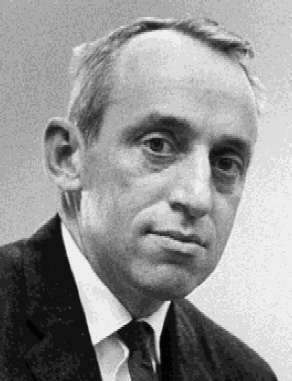
James Tobin was an American economist who served on the Council of Economic Advisers and consulted with the Board of Governors of the Federal Reserve System, and taught at Harvard and Yale Universities. He contributed to the development of key ideas in the Keynesian economics of his generation and advocated government intervention in particular to stabilize output and avoid recessions. His academic work included pioneering contributions to the study of investment, monetary and fiscal policy and financial markets. He also proposed an econometric model for censored dependent variables, the well-known tobit model.

John Kenneth Galbraith, also known as Ken Galbraith, was a Canadian-American economist, diplomat, public official, and intellectual. His books on economic topics were bestsellers from the 1950s through the 2000s. As an economist, he leaned toward post-Keynesian economics from an institutionalist perspective.
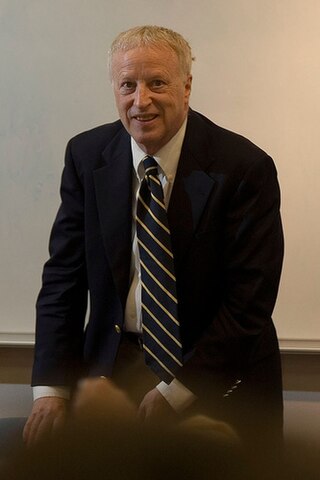
George Arthur Akerlof is an American economist and a university professor at the McCourt School of Public Policy at Georgetown University and Koshland Professor of Economics Emeritus at the University of California, Berkeley. Akerlof was awarded the 2001 Nobel Memorial Prize in Economic Sciences, jointly with Michael Spence and Joseph Stiglitz, "for their analyses of markets with asymmetric information." He is the husband of United States Secretary of the Treasury Janet Yellen.

James Kenneth Galbraith is an American economist. He is a professor at the Lyndon B. Johnson School of Public Affairs and at the Department of Government, University of Texas at Austin. He is also a Senior Scholar with the Levy Economics Institute of Bard College and part of the executive committee of the World Economics Association, created in 2011.
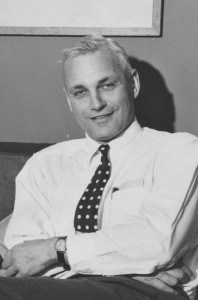
Paul Marlor Sweezy was a Marxist economist, political activist, publisher, and founding editor of the long-running magazine Monthly Review. He is best remembered for his contributions to economic theory as one of the leading Marxian economists of the second half of the 20th century.
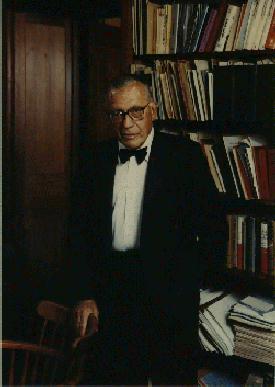
John Thomas Dunlop was an American administrator, labor economist, and educator. Dunlop was the United States Secretary of Labor between 1975 and 1976 under President Gerald Ford. He was Director of the United States Cost of Living Council from 1973 to 1974, Chairman of the United States Commission on the Future of Worker-Management Relations from 1993 to 1995, which produced the Dunlop Report in 1994. He was also arbitrator and impartial chairman of various United States labor-management committees, and a member of numerous government boards on industrial relations disputes and economic stabilization.
Institutional economics focuses on understanding the role of the evolutionary process and the role of institutions in shaping economic behavior. Its original focus lay in Thorstein Veblen's instinct-oriented dichotomy between technology on the one side and the "ceremonial" sphere of society on the other. Its name and core elements trace back to a 1919 American Economic Review article by Walton H. Hamilton. Institutional economics emphasizes a broader study of institutions and views markets as a result of the complex interaction of these various institutions. The earlier tradition continues today as a leading heterodox approach to economics.
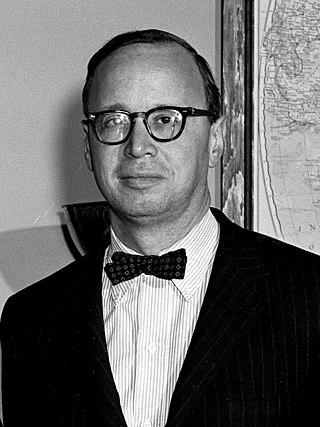
Arthur Meier Schlesinger Jr. was an American historian, social critic, and public intellectual. The son of the influential historian Arthur M. Schlesinger Sr. and a specialist in American history, much of Schlesinger's work explored the history of 20th-century American liberalism. In particular, his work focused on leaders such as Harry S. Truman, Franklin D. Roosevelt, John F. Kennedy, and Robert F. Kennedy. In the 1952 and 1956 presidential campaigns, he was a primary speechwriter and adviser to the Democratic presidential nominee, Adlai Stevenson II. Schlesinger served as special assistant and "court historian" to President Kennedy from 1961 to 1963. He wrote a detailed account of the Kennedy administration, from the 1960 presidential campaign to the president's state funeral, titled A Thousand Days: John F. Kennedy in the White House, which won the 1966 Pulitzer Prize for Biography or Autobiography.
Richard Parker is an economist from the United States. He is a graduate of Dartmouth College and the University of Oxford, and has worked for the United Nations Development Programme. Parker co-founded Mother Jones magazine and is on the editorial board of The Nation. He wrote the books The Myth of the Middle Class, Mixed Signals: the Future of Global Television News, and John Kenneth Galbraith: His Life, His Politics, His Economics.
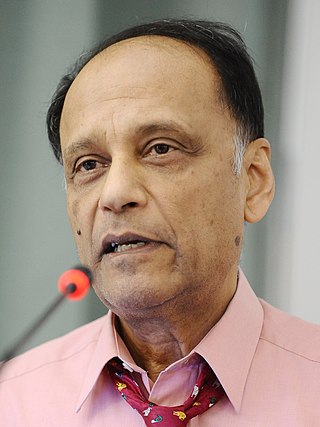
Sir Partha Sarathi Dasgupta is an Indian-British economist who is Frank Ramsey Professor Emeritus of Economics at the University of Cambridge, United Kingdom, and a fellow of St John's College, Cambridge.
Kenneth Milton Stampp, Alexander F. and May T. Morrison Professor of History Emeritus at the University of California, Berkeley (1946–1983), was a celebrated historian of slavery, the American Civil War, and Reconstruction. He was a visiting professor at Harvard University and Colgate University, Commonwealth Lecturer at the University of London, Fulbright Lecturer at the University of Munich, and held the Harmsworth Chair at Oxford University. In 1989, he received the American Historical Association Award for Scholarly Distinction. In 1993, he won the prestigious Lincoln Prize for lifetime achievement given by the Civil War Institute at Gettysburg College.

The Affluent Society is a 1958 book by Harvard economist John Kenneth Galbraith. The book sought to clearly outline the manner in which the post–World War II United States was becoming wealthy in the private sector but remained poor in the public sector, lacking social and physical infrastructure, and perpetuating income disparities. The book sparked much public discussion at the time. It is also credited with popularizing the term "conventional wisdom". Many of the ideas presented were later expanded and refined in Galbraith's 1967 book, The New Industrial State.
Countervailing power, or countervailance, is the idea in political theory that the wielding of power by two or more groups, centers, or sets of interests within a polity can, and often does, yield beneficial effects through productive opposition and containment between opposing forces. As a political concept, it resembles those of agonism, agonistic pluralism, and checks and balances, encapsulated in the often-quoted phrase from Federalist No. 51 that "ambition must be made to counteract ambition." The notion of countervailance has been applied in both politics and economics.

Leonid Hurwicz was a Polish–American economist and mathematician, known for his work in game theory and mechanism design. He originated the concept of incentive compatibility, and showed how desired outcomes can be achieved by using incentive compatible mechanism design. Hurwicz shared the 2007 Nobel Memorial Prize in Economic Sciences for his seminal work on mechanism design. Hurwicz was one of the oldest Nobel Laureates, having received the prize at the age of 90.
José Antonio Gomariz was an Argentine economist and educator.
Professors in the United States commonly occupy any of several positions of teaching and research within a college or university. In the U.S., the word "professor" is often used to refer to anyone who teaches at a college of university level at any academic rank. This usage differs from the predominant usage of the word professor in other countries, where the unqualified word "professor" only refers to "full professors". Other tenure-track faculty positions include assistant professor and associate professor (mid-level). Other teaching-focused positions that use the term "professor" include Clinical Professor, Professor of Practice, and Teaching Professor. Most faculty with titles of "Lecturer" and "Instructor" in the U.S. are not eligible for tenure, though they are still often referred to as "professors" in a general sense and as a courtesy form of address. Non-tenure-track positions may be full or part time, although the qualifier "adjunct" always denotes part-time.
Franklin Marvin Fisher was an American economist. He taught economics at the Massachusetts Institute of Technology from 1960 to 2004.
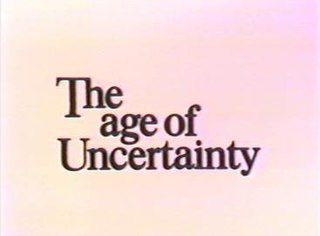
The Age of Uncertainty is a 1977 book and television series about economics, co-produced by the BBC, CBC, KCET and OECA, and written and presented by Harvard economist John Kenneth Galbraith.

Charles Marvin Williams was an American finance professor at Harvard Business School. He was a recognized authority on commercial banking who taught his students using the case method.
Deno John Geanakoplos was a renowned scholar of Byzantine cultural and religious history and Italian Renaissance intellectual history and the Bradford Durfee Professor Emeritus of Byzantine History, Renaissance History, and Eastern Orthodox Church History at Yale University. He was the author of 13 books and over 100 articles and was considered one of the foremost Byzantine scholars in the world. He was the father of Yale Economist and Professor John Geanakoplos.












